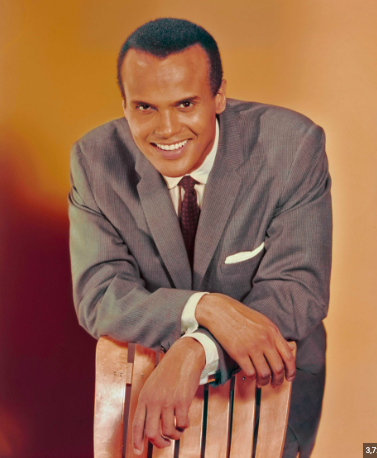The enduringly handsome Belafonte, who has died aged 96, had great success not just as a honey-voiced singer and a compelling actor, but also as a passionate and erudite campaigner for civil rights.
The seeds of his ambition and his social conscience were sown by his tough childhood. Harold Bellanfanti was born in Harlem, New York, and raised in a cramped apartment. His parents came from the Caribbean. His father, also called Harold, had been born in Martinique and was an itinerant ship’s cook; his mother, Melvine, born in Jamaica, worked as a domestic servant.
When Harry was six, his father left the family.
The boy was sent by his mother to study in Jamaica, where his American accent made him feel like an outsider at school. In Jamaica, he loved visiting the banana markets; many years later, after his international success with The Banana Boat Song (Day-O), he observed: “Not by chance did that song become my signature. I knew of what I was singing.”
After a few years, Belafonte returned to New York, dropped out of high school and entered the navy. It was 1944 and he was 17. Two strokes of good fortune changed his life. First, he met Marguerite Byrd, a young teacher from a black middle-class family, who four years later became his wife. He abandoned the menial jobs he had been doing and, thanks to the GI Bill of Rights, became a student and enrolled at Erwin Piscator’s drama school, where his peers included Marlon Brando and Sidney Poitier. With the latter, Belafonte trained at the studio theatre of the pioneering American Negro theatre in Harlem.
Except for some off-Broadway shows, he found little work as an actor and began singing, mainly in jazz clubs, such as the Village Vanguard and the Royal Roost in New York, earning a reasonable living for a couple of years. He also began recording, including some of his own songs. Tiring of the routine, in 1950 he opened a small restaurant, the Sage, in Greenwich Village, entertaining customers with folk songs. This, and his attachment to calypsos (he became known as “the Calypso King”), changed his style, and he was soon performing in more prestigious venues. He had signed a deal with Jubilee Records in 1949, and his records began to sell. Throughout his career, he recorded dozens of albums, including live concerts at Carnegie Hall, New York.
Belafonte won a Tony award in 1954 for his performance in the musical revue John Murray Anderson’s Almanac. By then, his film career was under way. After playing a headteacher in Bright Road (1953), he was cast in Otto Preminger’s 1954 movie version of the Broadway hit Carmen Jones, opposite Dorothy Dandridge. This all-black adaptation of Bizet’s Carmen, in which both his and Dandridge’s voices were dubbed, was a considerable success.
In 1957, Belafonte had top 10 hits in the UK with The Banana Boat Song and the title track from Island in the Sun, before achieving his biggest recording success with Mary’s Boy Child, which spent seven weeks at No 1 in 1957 and was re-released for the following two Christmases.
He began to appear on television, toured successfully in Europe and recorded several programmes for BBC television, working for a fraction of his normal fee because he enjoyed the extended nature of the shows, which gave him time to develop his performance. He became one of the first major artists to tour with a multiracial band and he integrated black performers into orchestras in prestige venues where the musicians had been exclusively white.
Belafonte and Byrd divorced in 1957, and he married Julie Robinson, the first white dancer to work with the Katherine Dunham company. The breakdown of his marriage had led Belafonte to seek psychiatric treatment, and his psychiatrist’s husband, a stockbroker, subsequently became Belafonte’s agent and manager, replacing Jack Rollins, the man responsible for masterminding Belafonte’s early career.
The 1950s was a period of considerable civil rights activism for Belafonte, who cited his friend Martin Luther King as the dominant influence on his life. When they first met, in 1954, they were in their mid-20s. “His courage was really quite remarkable,” Belafonte recalled. He embraced King’s message of nonviolence and lent his support to protest movements. With King, Belafonte was one of those who planned the 1963 march on Washington.
In the following year, he helped to raise and then personally delivered, with the assistance of Poitier, $70,000 in cash to support the work of the Student Nonviolent Coordinating Committee in Greenwood, Mississippi. Facing hostility from the Ku Klux Klan, the SNCC was striving to register black voters in the region. “In Mississippi’s vicious climate,” Poitier wrote, “the chances of a Klansman taking a potshot at me were actually pretty high.”
A television show, Tonight With Harry Belafonte (1959), brought Belafonte an Emmy, making him the first African American man to win the award. He returned to the screen in The World, the Flesh and the Devil (1959); the story of racial conflict within the science-fiction genre worked effectively. In the same year he made a thriller, Odds Against Tomorrow, with a racial subtext behind the animosity between two criminals.
Belafonte won a Grammy for best folk performance in 1960 for a powerful album of chaingang songs, Swing Dat Hammer. In 1965 he won another Grammy for best folk recording for an album he made with Miriam Makeba, the anti-apartheid activist. But another musical collaboration, with Petula Clark on her TV special in 1968, raised Belafonte’s profile further. During their performance of the song On the Path of Glory, Clark held Belafonte’s arm – much to the objection of an executive from the show’s sponsor, who feared that this show of intimacy between a white woman and a black man would enrage southern audiences. Clark refused to cut the performance from the programme, which had a warm reception when it was broadcast.
Returning to acting in 1970, he played a black angel, sent to earth to help Zero Mostel, in The Angel Levine, which he co-produced. He fared better producing Buck and the Preacher (1972), directed by his co-star, Poitier. The pair’s subsequent film, Uptown Saturday Night (1974), proved less successful.
In the mid-1980s, inspired by the success of Band Aid’s Do They Know It’s Christmas?, Belafonte helped to organise the charity single We Are the World, written by Lionel Richie and Michael Jackson and recorded by an all-star lineup of musicians including Stevie Wonder, Paul Simon and Diana Ross. The song reached No 1 in the US and the UK and won a Grammy. In 1987 Belafonte replaced Danny Kaye as Unicef’s goodwill ambassador; that year he chaired an International Symposium of Artists and Intellectuals for African Children in Senegal.
Having played himself in the satires The Player (1992) and Prêt-à-Porter (1994), Belafonte made a third film for the director Robert Altman, who cast him as Seldom Seen, a gang boss and club owner, in Kansas City (1996), for which Belafonte received the New York Critics Circle award for best supporting actor. Although he had not taken a leading role in a feature film for nearly 20 years, he was sufficiently tempted by the part of the bigoted Thaddeus Thomas in White Man’s Burden (1995), opposite John Travolta. He also joined the cast of Bobby (2006), Emilio Estevez’s film about Bobby Kennedy, whom Belafonte knew in the 60s.
Belafonte belatedly considered entering full-time politics in the Democratic party, but work, social commitments and family took precedence. Among his ongoing social concerns over the years were the National Association for the Advancement of Colored People; a school for emotionally disturbed boys; the prevention of gang violence; and his own Belafonte Foundation of Music and Arts.
He remained a force to be reckoned with, in 2002 likening the then US secretary of state Colin Powell to a slave who “got the privilege of living in the house if you served the master, exactly the way the master intended to have you serve him”. He lent his support to the Occupy movement in 2011, and when asked in a Guardian interview the following year which living person he most despised, he replied: “George W Bush, for his betrayal of America.”
His autobiography, My Song (2011), was followed by a documentary about his life, Sing Your Song. His final film role was a cameo as a veteran activist in Spike Lee’s BlacKkKlansman (2018).
In 2008, following divorce from his second wife, he married Pamela Frank. She survives him, along with the two daughters of his first marriage, and the son and daughter from his second.


